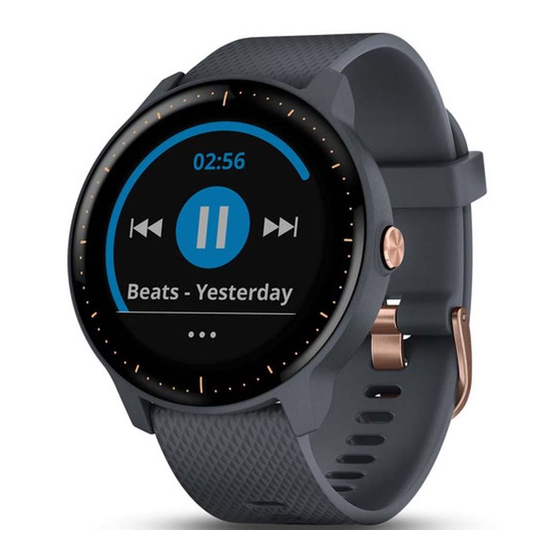Garmin VIVOACTIVE 3 MUSIC Manual do Proprietário - Página 19
Procurar online ou descarregar pdf Manual do Proprietário para Ver Garmin VIVOACTIVE 3 MUSIC. Garmin VIVOACTIVE 3 MUSIC 30 páginas.

Creating a Custom Watch Face
You can customize the style and data fields for the watch face.
1
From the watch face, hold the touchscreen.
2
Select Watch Face.
3
Select an option:
• To customize an existing watch face, select the watch
face, and select Customize.
• To create a new watch face, swipe to the bottom of the
watch face list, and select Create New.
4
Swipe up or down to scroll through the analog and digital
dials, and tap the screen to select the displayed dial.
5
Select each data field you want to customize, and select the
data to display in it.
A green border indicates the customizable data fields for this
dial.
6
Swipe left to customize the watch face hands.
NOTE: This option is available only for analog dials.
7
Swipe up or down to scroll through the hand styles, and tap
the screen to select the displayed hands.
8
Swipe left, and select an accent color.
9
Select
.
10
Select Done.
The device sets the new watch face as your active watch
face.
Customizing the Controls Menu
You can add, remove, and change the order of the shortcut
menu options in the controls menu
page
1).
1
Hold the key.
The controls menu appears.
2
Hold the touchscreen.
The controls menu switches to edit mode.
3
Select the shortcut you want to customize.
4
Select an option:
• To change the location of the shortcut in the controls
menu, select the location where you want it to appear, or
drag the shortcut to a new location.
• To remove the shortcut from the controls menu, select .
5
If necessary, select
to add a shortcut to the controls menu.
NOTE: This option is available only after you remove at least
one shortcut from the menu.
Activities and App Settings
These settings allow you to customize each preloaded activity
app based on your needs. For example, you can customize data
pages and enable alerts and training features. Not all settings
are available for all activity types.
Press the key, select an activity, and select Settings.
Data Screens: Enables you to customize data screens and add
new data screens for the activity
Screens, page
15).
Alerts: Sets the training alerts for the activity
Laps: Sets the options for the Auto Lap
Using the Auto Lap Feature, page
manual lap function
(Turning On the Manual Lap Function,
page
16).
Auto Pause: Sets the device to stop recording data when you
stop moving or when you drop below a specified speed
(Using Auto Pause
, page
®
Customizing Your Device
(Using the Controls Menu,
(Customizing the Data
(Alerts, page
feature
(Marking Laps
®
16), and turns on the
16).
Auto Scroll: Enables you to move through all of the activity data
screens automatically while the timer is running
Scroll, page
16).
GPS: Sets the mode for the GPS antenna. Using GLONASS
provides increased performance in challenging environments
and faster position acquisition. Using the GLONASS option
can reduce battery life more than using the GPS option only.
Pool Size: Sets the pool length for pool swimming.
Background: Sets the background color of each activity to
black or white.
Accent Color: Sets the accent color of each activity to help
identify which activity is active.
Customizing the Data Screens
You can customize data screens based on your training goals or
optional accessories. For example, you can customize one of
the data screens to display your lap pace or heart rate zone.
1
Press the key.
2
Select an activity.
3
Select Settings > Data Screens.
4
Select one or more options:
• To adjust the style and number of data fields on each data
screen, select Layout.
• To customize the fields on a data screen, select the
screen, and select Edit Data Fields.
• To show or hide a data screen, select the toggle switch
next to the screen.
• To show or hide the heart rate zone gauge screen, select
HR Zone Gauge.
Alerts
You can set alerts for each activity, which can help you to train
toward specific goals. Some alerts are available only for specific
activities. Some alerts require optional accessories, such as a
heart rate monitor or cadence sensor. There are three types of
alerts: event alerts, range alerts, and recurring alerts.
Event alert: An event alert notifies you once. The event is a
specific value. For example, you can set the device to alert
you when you burn a specified number of calories.
Range alert: A range alert notifies you each time the device is
above or below a specified range of values. For example, you
can set the device to alert you when your heart rate is below
60 beats per minute (bpm) and over 210 bpm.
Recurring alert: A recurring alert notifies you each time the
device records a specified value or interval. For example, you
can set the device to alert you every 30 minutes.
Alert Name Alert Type
Cadence
Range
Calories
Event,
recurring
Custom
Recurring
Distance
Recurring
Heart Rate Range
15).
Pace
Range
Run/Walk
Recurring
Speed
Range
(Using Auto
Description
You can set minimum and maximum
cadence values.
You can set the number of calories.
You can select an existing message or
create a custom message and select an
alert type.
You can set a distance interval.
You can set minimum and maximum
heart rate values or select zone changes.
You can set minimum and maximum
pace values.
You can set timed walking breaks at
regular intervals.
You can set minimum and maximum
speed values.
15
